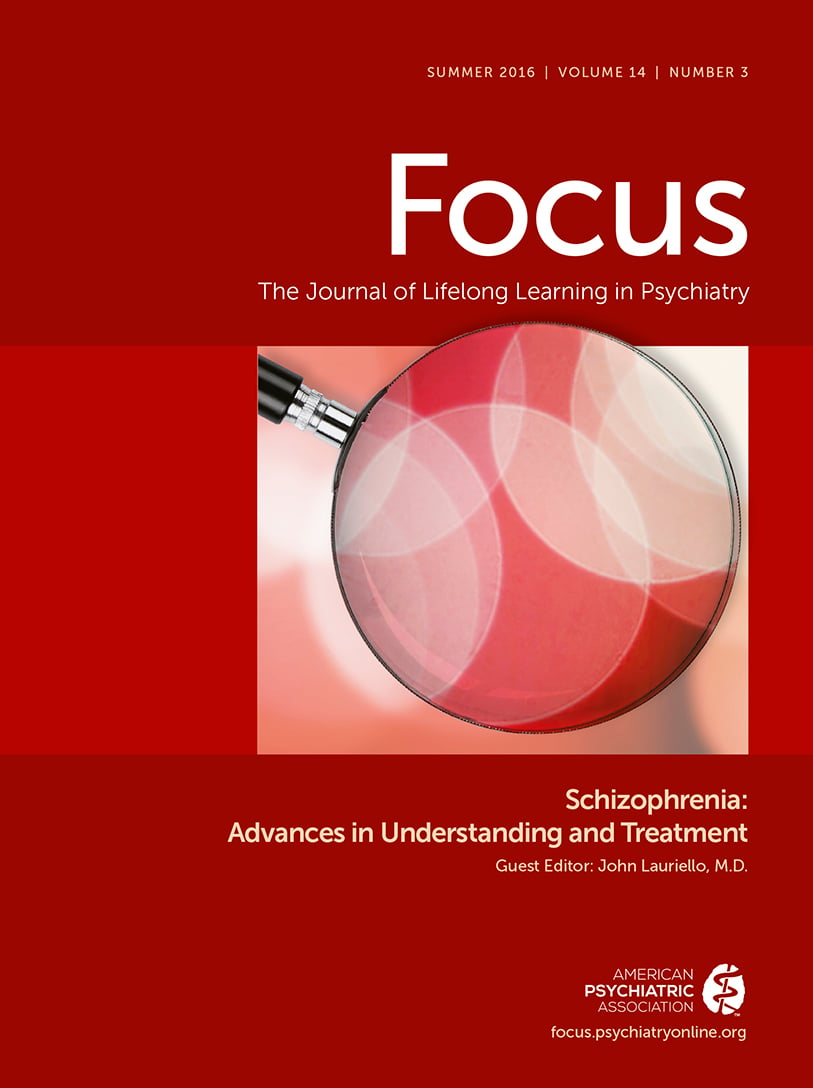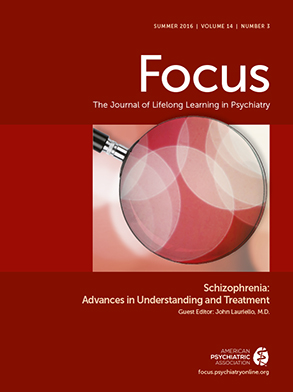I'm trying to figure out the best way of working with families whose loved one has schizophrenia. How do you tell families about schizophrenia?
Partnering with families to optimally support the recovery of their loved one from a psychotic episode or through their lifelong recovery journey with schizophrenia is a learned skill. I’m reminded of this because when I was a resident, my best teacher, Kathleen, was a social worker who was remarkably kind, optimistic yet pragmatic, knowledgeable, and readily accessible to family members. Beyond observing Kathleen’s wonderful empathy with families, she taught me another invaluable lesson for communicating with families: “Lose the ‘psycho’ jargon.” In other words, explain things in everyday terms and with commonsense logic. . . . After all, that’s the hallmark of an expert.
Timing is the greatest dilemma for all of us in communicating with relatives about a psychotic illness. When a loved one expresses floridly psychotic behavior, relatives face an extraordinary stressful and perplexing time. They may have seen bizarre behavior or heard strange, unreal assertions (“My food is being poisoned,” “The devil is talking to me,” “I’m going to hell soon”), and a crisis may have precipitated a hospitalization (which is particularly distressing when it is involuntary) or visit to the emergency room. Moreover, first-time exposure of relatives to the (often chaotic) mental health system is likely stressful, typically involving uncertainty, long delays, unusual interview questions (which can even appear intrusive, derogatory, or accusatory), inpatient visitation rules, and uncertainties of coverage by insurance companies. In such circumstances, distressed relatives should not be subjected to a “lecture” about schizophrenia as a lifelong, debilitating condition, nor is it the time for being evasive or disengaged. Relatives will have their own preconceived ideas and concerns about mental illness. They will also have consulted the Internet and read various (likely harrowing) accounts online that may or may not be relevant to the situation at hand.
The initial communication to relatives about a psychotic episode or schizophrenia should be to reassure the relative of the team’s commitment and competency to care for their loved one, to explain what “psychosis” is, to clarify what is going to happen next over the short term, to listen, and to answer questions. Doing all that requires time, thought, and compassion.
Offering reassurance to relatives that their loved one has “come to the right place” and that he or she will get the best care available is essential to establishing a partnership with them. Reassurance is enhanced by being knowledgeable (again, no need for jargon), empathetic, and concerned and by being able to tolerate and explain the uncertainty of this new situation that both the patient and the relatives now find themselves in.
The term “psychosis” is a much more useful and more accurately descriptive term to use than “schizophrenia” in discussions with relatives at this time. If the individual is experiencing a first-episode psychosis, no one (including the clinician) knows what caused it and whether it will abate, continue, or progress to schizophrenia. “Schizophrenia” is a frightening and highly stigmatized term. Respecting both clinical uncertainty and professional nomenclature, it is advisable to stay away from the term at this juncture. (There are, of course, explicit phenomenological criteria and duration of disability attributes that must be met before the diagnosis of schizophrenia is valid.) The term “psychosis” provides a valid explanation and accommodates the ambiguity of diagnosis and treatment course. It is a term that relatives can work with. Indeed, relatives often complain that drug abuse was overlooked at first presentation and that the term “schizophrenia” was used prematurely.
The explanation and use of “psychosis” has another important advantage at this particular time; it requires the treatment team and relatives to remain open and investigative of other potential causes (drugs, trauma, metabolic effects, etc.) that might underlie the psychosis. Even though the diagnostic yield from tests such as brain imaging is low in first-episode psychosis, it is important and reassuring to relatives to know that a comprehensive evaluation is underway. Moreover, communication of “negative” results is itself helpful and supportive of relatives’ concerns.
Without being alarmist, it is important to clarify with relatives—as well as to communicate back to them—the potential risks of a first psychotic episode. Is the person depressed? Is he or she suicidal or homicidal? These are key aspects of the evaluation that will dictate further treatment. It is important that everybody be knowledgeable, share information, and appreciate these aspects of the evaluation.
Enabling relatives to make an informed decision to initiate treatment with antipsychotic medications is an important step in effective communications with the patient’s family. The family needs factual information that is balanced and seeks to encourage a trial of medications without “dooming it from the start” by a lengthy discussion about side effects that may not be relevant at this initial stage. As an example: antipsychotic medication–induced diabetes is a serious side effect that is not likely to occur within the first 10 days of treatment; however, at this stage it may not be clear to the clinician how long treatment might be required. This calls for a balanced and informed discussion of the risk-benefit profile of antipsychotic medications. It requires an explanation of why one particular drug might be selected (relatives can readily appreciate the trial-and-error logic of medication selection). It is important to stress and offer additional treatment options and to discuss these with patient and relatives alike.
There are other important considerations to effective communications with relatives. For example, relatives are likely to ask questions about causation (e.g., Was a birth complication the offending injury? Did drugs cause the condition? What role did stress play? Was this our fault?). Relatives also are inevitably concerned (whether they voice this or not) about the genetic implications, both for themselves and for younger relatives. The interplay between substance abuse and psychosis is important and must be discussed. There should be discussions about principles of recovery, shared decision making, and treatment alliance. (The terms “compliance” and “adherence” can be awkward in discussions with first-episode patients and their relatives.) There will also be multiple opportunities to recommend social supports, peer support, and family support; the National Alliance on Mental Illness is an invaluable resource for additional helpful information, and so too are other Internet sites and publications. Encouraging second opinions and offering continued clarifications, advice, and empathy are all valuable at this stressful stage.
Above all else, this is the time for developing an effective, two-way partnership with relatives that will form a cornerstone for the longer recovery process. Timing is everything (
Box 1). There will be opportunities to meet with relatives for further clarification and to reinforce key information to help them support their loved ones. Everyone appreciates being treated with dignity and compassion, whether we are dealing with a person with schizophrenia, or obsessive-compulsive disorder, or diabetes, or cystic fibrosis.

